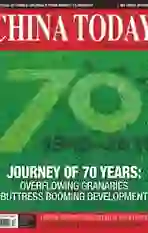Food Security Consolidated in China
2019-11-25BystaffreporterLIYUAN
By staff reporter LI YUAN

THROUGHOUT the ages, food security has been a top priority for ensuring the stability and prosperity of nations. Not surprisingly, therefore, the supply of food to more than a billion people is of paramount importance on Chinas national agenda. Great value has been attached to food self-sufficiency by the country.
Since the 18th National Congress of the Communist Party of China (CPC) was held in 2012, the Chinese government has constantly increased investment, reinforced scientific and technological support, advanced rural reform, and promulgated preferential policies for agricultural and rural development. The administration has put forward a national food security strategy in the new era, leading the Chinese people to blaze a path of food security with Chinese characteristics.
An Essential Foundation
As a famous Chinese saying goes, a full granary can guarantee peace of the world and prevent social turmoil. In the course of human development, people have recognized that food security is not just confined to economics, but is of political significance.
Since the 18th CPC National Congress, the CPC Central Committee, with Xi Jinping at its core, has proposed a new strategy on national food security emphasizing self-sufficiency, enhanced grain production capacity, proper import, and the important role of science and technology based on assessment of the current global situation, national circumstances as well as agricultural conditions.
Strategically, food self-sufficiency is a must. A country with a population over 1.3 billion cant afford consigning its grain security to the international market. Or, any global market fluctuation can possibly be translated into a huge domestic turbulence.
Therefore, China should be diligent in its efforts to ensure basic self-sufficiency of grain and absolute grain ration security.
Efforts should also be devoted to ensuring production capacity and strengthening scientific and technological support. China should protect arable land, improve policies, strengthen irrigation and water conservancy systems, upgrade facilities and equipment, and constantly improve land output rate, resource utilization rate, labor productivity, and scientific and technological contribution rate. These efforts will enhance the comprehensive grain production capacity.
Over the past 70 years since the founding of the Peoples Republic of China, Chinas grain production has been elevated to a new level, from an all-around shortage of supply to a balance of supply and demand. In 2018, Chinas total grain output exceeded 657.9 billion kg, 4.8 times higher than that of 1949. The change in output signifies the sustained growth of Chinas total grain output. In the past, 800 million people were subjected to insufficient food, while today 1.4 billion people enjoy sufficient food.
With the support of science and technology, China has steadily promoted supply-side structural reform in the agricultural sector. While ensuring grain production, more focus has been put on the green safety of grain production. Green development has become the dominating theme of Chinese agriculture. The pursuit of high-quality food is a new direction in Chinas grain production through unremitting exploration and institutional innovation.
Chinas Contribution to the World
On June 23, 2019, the 41st session of the General Conference of the Food and Agriculture Organization (FAO) of the United Nations was held in Rome, Italy. Qu Dongyu, vice minister of agriculture and rural affairs of China, was elected head of the FAO by a majority in the first round of elections, becoming the first Chinese director-general in the history of the organization.
This election reflects the high appreciation of all parties for Chinas firm support of multilateralism and its promotion of global food and agriculture development, as well as the recognition of Chinas food security and rural development achievements by the international community.
In addition, while China has succeeded in feeding more than a fifth of the worlds population, it has never neglected the problems handicapping the globe. China has always been a positive force in safeguarding world food security.
From the First World Food Conference in 1974, when delegates and experts expressed concern about Chinas “impossibility of feeding a billion people,” to the 1984 FAO Conference, when the Chinese government made the announcement to the world that“China has basically resolved the problem of food and clothing shortage,” from being a food aid recipient to a major donor offering technical assistance and food solutions to a group of countries in the southern hemisphere; China has committed itself to poverty eradication and food security while contributing to world food security.
At the same time, with its expertise in crop cultivation, irrigation, and aquaculture, agricultural mechanization and other technologies, China is helping countries suffering grain shortages along the routes of the Belt and Road to produce more grain.
To promote exchanges and cooperation in the field of agriculture, in recent years, China has established agricultural technology demonstration centers, agricultural technology experimental stations and technology promotion stations in nearly 100 countries around the world. It has also dispatched thousands of agricultural experts to help these countries train a large number of grain technicians. The combination of small-scale household production and modern agricultural development in China has provided experiences that can be replicated for reference to other developing countries in the world.
Knowing that there is always food on the table correlates with the safety of the country and the happiness of its people. Chinas grain stocks are abundant and the market supply is sufficient, while its grain output is increasing year by year. These remarkable achievements have answered the question of “who will feed China?” and boosted the confidence of the Chinese people to ensure an ample food supply.
